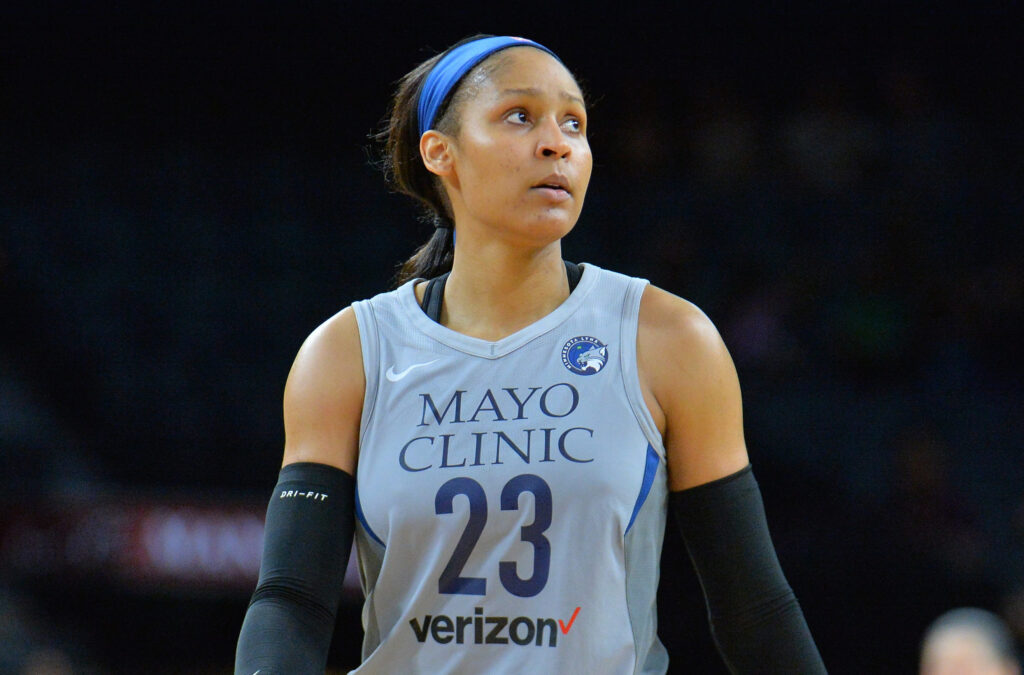On Nov. 29, 2014, five days after a Missouri grand jury decided not to indict the police officer who killed Micheal Brown, Ariyana Smith became the first athlete to bring the #BlackLivesMatter movement into the sports landscape.
While Muhammad Ali, Colin Kaepernick and LeBron James are commonly thought of as the torchbearers of sports activism, Just Women’s Sports knows Black women have always been at the forefront of driving change. In the first piece of our Black History Month series, we shared the stories of Rose Robinson and Wyomia Tyus, athletes who fought against injustice in the 1950s and ‘60s. Since then, a myriad of Black sportswomen have taken action, some recognized and some not.
Smith, a basketball player at Knox College, suited up to play against Fontbonne University in Clayton, Miss., mere minutes from Ferguson. When the national anthem began to play, Smith raised her hands in the now iconic “Hands Up, Don’t Shoot” gesture before laying on the ground. Officials tried to move Smith in an attempt to start the game, but she continued her demonstration for four and a half minutes, symbolic of the four and a half hours Mike Brown’s body lay in the street after he was killed.
While the #BlackLivesMatter movement has spurred a frenzy of demonstrations in sports, Black women have been championing a variety of topics before the age of kneeling began. In the past twenty years, issues of racism, sexism and equality have been thrust into the public discourse due to the actions of Black women in sports, committed to creating a more just world for those who come after them.
Toni Smith
More than a decade before Ariyana Smith took a stand, a different Smith protested the national anthem. In 2003, Toni Smith, a senior basketball player at Division III Manhattanville College, turned her back to the flag in protest against inequality and the country’s involvement in Iraq.

Venus Williams
In 2006, Venus Williams penned an open letter in The Times in a push for equal pay. A year earlier, she had addressed the Grand Slam Board, advocating for an equal distribution of prize money at the French Open and Wimbledon. Williams’ voice brought attention to the pay discrepancies in the sport of tennis and led to the leveling of pay at Wimbledon. When she won her fourth Wimbledon trophy in 2007, Williams became the first woman to receive the same earnings as that of the men’s champion.
Seimone Augustus
Seimone Augustus, a four-time WNBA champion and one of the most decorated players in women’s basketball, advocated for gay marriage in 2012. The 2011 WNBA Finals MVP wanted to marry her wife in the state where she had won a championship the year prior. The Minnesota Lynx star spoke out against a ballot measure that would have made same-sex marriage illegal in the Minnesota state constitution.
Brittney Griner and Layshia Clarendon
In 2017, Brittney Griner and Layshia Clarendon co-wrote an op-ed in which they voiced their opposition to a Texas bill that would have barred transgender people from using restrooms and other public facilities of their choosing. The WNBA stars saw the bill as a danger to queer athletes who may have been forced to use a locker room that differed from their gender identity.
Maya Moore
Maya Moore, one of the most accomplished women’s basketball players in the history of the sport, stepped away from the game at the peak of her success to pursue criminal justice reform. Moore dedicated herself to freeing her now-husband Jonathan Irons, who had been falsely imprisoned for burglary and assault. With the help of Moore, a judge overturned Irons’ conviction after he spent 23 years of his life in prison.
Serena Williams
Serena Williams has been outspoken about gender and racial equality for most of her illustrious tennis career. She wrote an open letter in 2016 addressing equal pay, and another in 2017, on Black Women’s Equal Pay Day, focusing on pay inequities unique to Black women. In 2018, Serena and Venus Williams joined the Billie Jean King Initiative to push for equal pay for women in all industries.

Allyson Felix
Allyson Felix brought attention to Nike’s refusal to guarantee salary protections for pregnant athletes in a 2019 New York Times op-ed. Felix, the most decorated U.S. track athlete, said that Nike attempted to pay her 70 percent less after she became a mother. Shortly after Felix’s public appeal, the company expanded its pregnancy benefits for women athletes.
Allyson Felix and Serena Williams are also champions for Black maternal health. Both women experienced life-threatening complications during childbirth, common to Black women. Felix underwent an emergency C-section to save herself and her daughter after doctors discovered she had severe preeclampsia. Williams developed a pulmonary embolism and a hematoma shortly after she gave birth, resulting in a series of surgeries and weeks of recovery before regaining her health.
Williams’ story brought national attention to the Black maternal health crisis, and she invested $3 million in a Black-owned startup aimed at improving prenatal and postpartum care for new mothers. Felix testified before Congress to petition the government to address systemic biases that lead to disparities in maternal mortality.
Gwen Berry
Gwen Berry raised her fist during the national anthem after winning the hammer throw at the 2019 Pan American games. Berry, a thrower for the U.S. women’s track and field team, was protesting racial inequality and police brutality, and was subsequently put on a 12-month probation by the U.S. Olympic and Paralympic Committee. As a result, Berry lost several sponsorship deals, totaling nearly $50,000. After the Olympic Committee reversed their stance on protests in 2020, Berry demonstrated again at the 2021 Olympic Trials, this time by turning away from the flag.
Naomi Osaka
Days after Jacob Blake, an unarmed Black man, was shot by police in Kenosha, Wisc., Naomi Osaka refused to play the semifinals of the Western and Southern Open, forcing the tournament’s postponement. Less than a week later, she arrived at the 2020 U.S. Open with seven masks in her duffle bag, each embroidered with the name of a Black victim of police violence: Breonna Taylor, Elijah McClain, Ahmaud Arbery, Trayvon Martin, George Floyd, Philando Castile and Tamir Rice. Osaka wore a different mask during each round of the tournament, winning her second U.S. Open title while drawing international attention to police brutality.

Raven Saunders
At the 2021 Tokyo Olympics, while standing on the podium, Raven Saunders raised her arms and crossed them into an “X.” The American made the Game’s first podium demonstration after winning silver in the shot put. As a gay, Black woman with a history of mental health struggles, Saunders’ crossed arms symbolized the intersection of her oppressed identities.
Simone Biles
On the eve of further cementing herself as the greatest gymnast of all time, Simone Biles withdrew from the team final and women’s individual all-around final at the Tokyo Games. She cited mental exhaustion and physical health concerns after experiencing the “twisties,” a state of dissociation that inhibits a gymnast from completing a skill.
As arguably the face of the Tokyo Olympics, dealing with the pressure of breaking world records, Biles felt the weight of the world on her shoulders. In a sport that has long demanded obedience from its young athletes, the simple act of saying “no” sparked a moment of reckoning in sports. Biles, who announced in 2018 that she was sexually abused by Larry Nassar, a longtime doctor for USA Gymnastics, spurred conversations about mental health, abuse and exploitation with her decision. Biles, like so many other Black women athletes, continues to leverage her platform to drive societal change.
Mariah Lee is a professional athlete and freelance writer who specializes in the intersection of race and sports. She holds a B.A. from Stanford University and a M.S. from the Wake Forest School of Business. Follow her on Instagram @merdashewrote.

